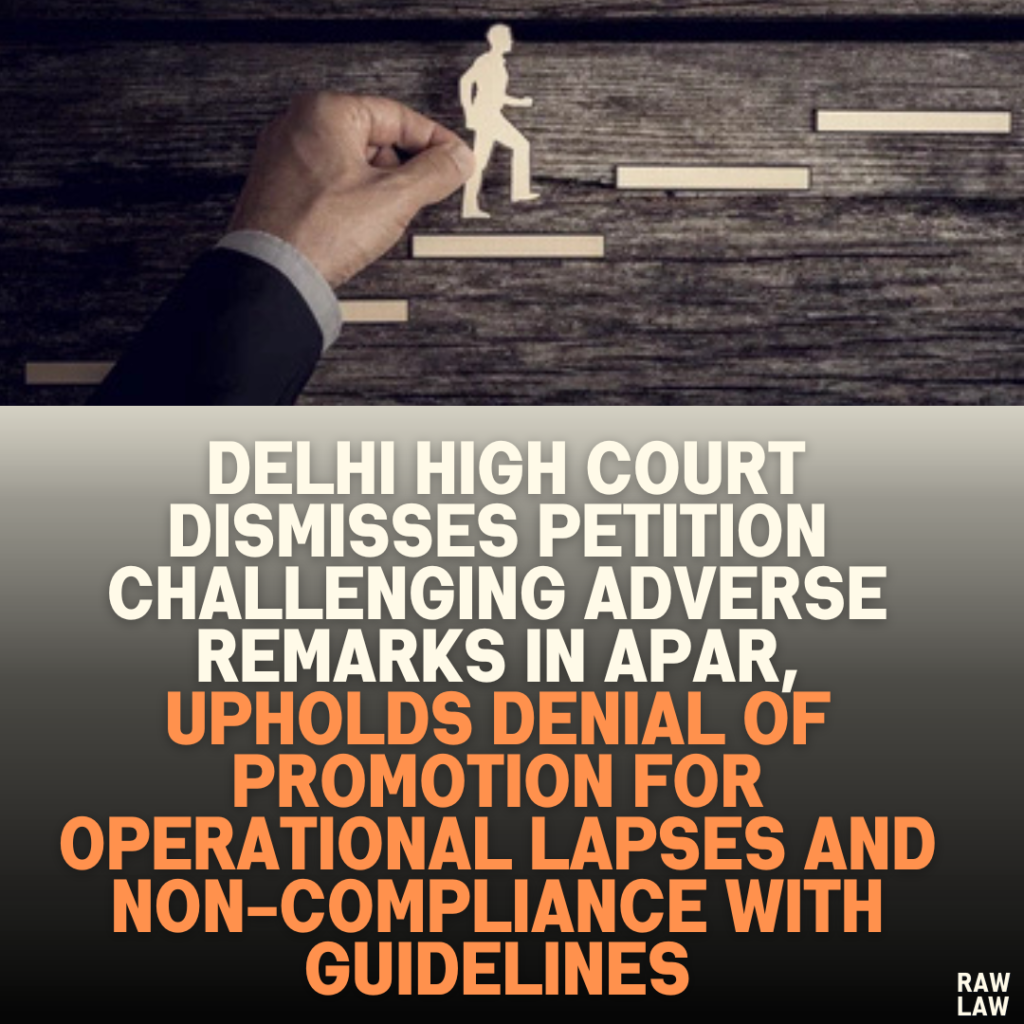Court’s Decision
The Delhi High Court dismissed the petitioner’s challenge to adverse remarks in his Annual Performance Appraisal Report (APAR) for the year 2016-17. It upheld the Departmental Promotion Committee’s (DPC) decision to deny him promotion to the rank of Commandant in the Indo-Tibetan Border Police (ITBP), stating that the adverse remarks were based on factual and critical aspects of his performance. The court noted that no malafide intent was alleged against the reporting officers and found the process fair and in compliance with the applicable guidelines.
Facts
- Service Background: The petitioner, a senior officer in ITBP, had served the organization since 1988. He had an otherwise commendable service record with consistent “Very Good” and “Outstanding” ratings in his APARs for other years.
- Adverse Remarks in APAR (2016-17):
- The petitioner was found to have made inadequate night halts at forward posts in Naxal-affected areas, violating Standing Operating Procedures (SOPs).
- He was involved in unauthorized distribution of liquor in restricted operational areas, compromising security.
- Petitioner’s Representations: He submitted multiple representations challenging the adverse remarks, which were rejected by the competent authority. He also approached the Service Court, a grievance redressal mechanism that was later abolished before a decision was rendered.
- Promotion Denied: Based on the adverse remarks, the petitioner was declared unfit for promotion by the DPC.
Issues
- Whether adverse remarks in the petitioner’s APAR for 2016-17 were justified.
- Whether the petitioner was rightly denied promotion based on these remarks.
- Whether warnings or advisories could be reflected in APARs as adverse remarks.
Petitioner’s Arguments
- Challenge to Adverse Remarks:
- The petitioner argued that the adverse remarks were unsubstantiated and based on minor infractions such as warnings and advisories, which do not constitute penalties.
- He cited guidelines that state warnings or advisories should not bar promotion.
- Retrospective Promotion: He contended that his juniors were promoted despite his better performance, violating the principle of seniority and merit.
- Service Court: He alleged procedural unfairness, stating that the Service Court failed to address his grievance before being abolished.
- Principles of Natural Justice: The petitioner claimed that the authorities failed to provide valid reasons for rejecting his representations and did not adequately consider his appeal.
Respondent’s Arguments
- Factual Basis of Adverse Remarks:
- The respondents asserted that the petitioner had violated SOPs and operational guidelines in a sensitive, Naxal-affected area, which warranted the adverse remarks.
- They highlighted that the petitioner accepted responsibility for some of these violations, including unauthorized liquor distribution.
- Promotion Guidelines:
- As per the guidelines, an officer must have at least three “Very Good” ratings in the last five APARs, with no adverse remarks.
- The petitioner failed this criterion due to the adverse remarks in his APAR for 2016-17.
- Judicial Scope: The respondents argued that the court could not reassess the factual findings in the APAR unless malafide intent or procedural irregularities were proven.
Analysis of the Law
- Promotion Guidelines:
- The guidelines for promotion in paramilitary forces mandate:
- A minimum of three “Very Good” ratings in the last five APARs.
- No adverse entries in the APARs under consideration.
- The petitioner’s adverse remarks disqualified him from meeting these criteria.
- The guidelines for promotion in paramilitary forces mandate:
- APAR Guidelines:
- As per the Department of Personnel and Training (DoPT), warnings or advisories, while not penalties, may be recorded in APARs if deemed relevant by the reporting authority.
- Such entries, if adverse, must be communicated to the officer, who has the right to represent against them.
- Judicial Review:
- Courts typically avoid interfering with factual assessments in APARs unless procedural violations, bias, or malafide intent are evident.
- In this case, no malafide intent was alleged, and the petitioner had been granted the opportunity to represent against the adverse remarks.
Precedent Analysis
- Relevance of Warnings in APARs: Previous guidelines and case law establish that warnings or advisories can be included in APARs if they reflect significant aspects of an officer’s performance.
- Judicial Restraint: Courts have consistently upheld the discretion of reporting authorities to evaluate performance, provided the process adheres to prescribed rules.
Court’s Reasoning
- Adverse Remarks Justified:
- The petitioner’s violations were factual and significant, involving operational and security lapses in sensitive areas.
- The warnings and advisories issued were properly communicated and not challenged by the petitioner at the time.
- No Procedural Irregularity:
- The adverse remarks were recorded in accordance with the guidelines, and the petitioner’s representations were duly considered and rejected.
- The petitioner failed to demonstrate procedural lapses or bias in the process.
- Role of Warnings in APARs:
- The court clarified that warnings or advisories could be included in APARs to reflect significant performance issues, even if they do not constitute penalties.
- Promotion Denied in Line with Guidelines:
- Since the petitioner’s APAR for 2016-17 contained adverse remarks, he did not meet the eligibility criteria for promotion to the rank of Commandant.
Conclusion
The court dismissed the petition, affirming the validity of the adverse remarks and the denial of promotion. It held that the petitioner’s actions constituted significant performance lapses and that the authorities acted within their discretion.
Implications
- Operational Guidelines: The judgment underscores the importance of strict adherence to operational protocols in paramilitary forces, especially in sensitive areas.
- Performance Evaluations: It reaffirms the authority of reporting officers to include significant warnings or advisories in APARs when warranted.
- Judicial Restraint: The decision highlights the limited scope of judicial review in matters of service evaluation, emphasizing adherence to guidelines and procedural fairness.
